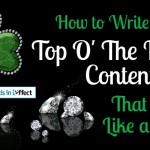For those of us who write, edit, and consume content and advertising copy, punctuation madness is becoming harder and harder to escape. We find it everywhere, from billboards and brochures to landing pages and blog posts. It’s even managed to infect television spots (I’ve witnessed it firsthand). Oh, the horror of seeing the English language butchered in plain sight—and target audiences recoiling in terror!
Content marketers, are you aware of the dire threat punctuation madness poses to your brand? Do you take it as seriously as you should?
Mad punctuation attacks copy like an army of mindless zombies, eating away at coherence and meaning until your message lies in tatters. No matter how brilliant your ideas or clever your wordplay, punctuation that’s overused, underused or sorely misused will consume everything in its path until the only thing your readers notice is the carnage left behind.
Marketers, You Must Respect the Power of Punctuation
“Punctuation marks are to writing what vocal delivery is to speech.”
—Janis Bell, from her book Clean, Well-Lighted Sentences
When punctuation marks are put to good use and function as they should, we barely notice them. Their presence and effect can be subtle, but they act with great purpose. Punctuation plays an enormous role in the look, feel, and meaning of text.
The simplest punctuation errors (e.g., using it’s as a possessive pronoun) can be excruciating , but they’ve been written about ad nauseam. (I’ve gotten into the ring too, warning marketers not to “anger the Grammar Gods.”) My greatest concern is the fact that too few people understand and respect the power of punctuation—and how destructive that power can be if used improperly.
Consider all that punctuation does for us:
It sets the tone.
Formal? Folksy? Familiar? Punctuation points the way.
Semicolons send a very different signal than em dashes; the exclamation point and the period each has its own vibe. The same string of words can be interpreted a variety of ways depending on how it’s punctuated, so make sure you’re punctuating appropriately for a given audience.
It eliminates ambiguity.
Never leave readers wondering what you mean…
Dogs who love their masters will be rewarded.
Dogs, who love their masters, will be rewarded.
(Those commas mean the difference between a select group of dogs and ALL dogs. Big distinction.)
…or laughing at your expense.
My biggest heroes are my parents, Superman and Wonder Woman.
My biggest heroes are my parents, Superman, and Wonder Woman.
(If your parents aren’t Superman and Wonder Woman, you need that Oxford comma!)
It creates subtle variations in meaning.
Henry passed the note (which he took great pains to edit).
Henry passed the note, which he took great pains to edit.
In the first sentence, the clause in parentheses is an aside—not as critical to the story as the act of passing the note. In the second, the fact that Henry took great pains to edit the note seems equally important to the story. Did you catch the distinction?
It clarifies relationships between ideas.
Here is a terrific example from Lynne Truss’s New York Times bestseller Eats, Shoots & Leaves. See how the relationship changes from one pair of statements to the next?
Tom locked himself in the shed. England lost to Argentina. (There’s no clear relationship here.)
Tom locked himself in the shed; England lost to Argentina. (These might have happened simultaneously or in close succession, but it’s not clear they’re causally related.)
Tom locked himself in the shed: England lost to Argentina. (The first event was caused by the second.)
It emphasizes key words or phrases.
Midterm exams were finally over.
Midterm exams—finally!—were over.
Isn’t the second sentence a bit more colorful? You can almost taste the test taker’s relief.
It improves rhythm and flow.
Just as we writers advise others to vary sentence length and structure, we also understand that punctuation can help make any text—no matter how dry the subject—read like lyrical prose.
Now, imagine if I had ended the above sentence like this:
…we also understand that punctuation can help make any text read like lyrical prose, no matter how dry the subject.
A little underwhelming, wouldn’t you say?
In a World Gone Mad…
Now, imagine each of the aforementioned punctuation superpowers in the wrong hands. The result would be a monotonous, confusing, laughable mess, and audiences would run for the hills. I just can’t stress it enough: Punctuation madness kills!
Do you appreciate the power of punctuation? What errors do you find maddening—or maddeningly funny? Don’t hold back!

Since 2001, Becky Tumidolsky has written awareness-building content for B2B brands and their discerning audiences. Her work has appeared in leading publications such as Forbes, U.S.News & World Report, Bloomberg Markets, Newsweek, and Inc. as well as corporate blogs, websites, white papers, and other content assets.
Becky loves writing fluid, error-free prose. She’s even more passionate about building the foundation for her work—uncovering core brand distinctions, framing them thematically, and developing fresh, compelling narratives that advance corporate strategies.
Follow and connect: Twitter| Google+| LinkedIn| Facebook






Leave a Reply